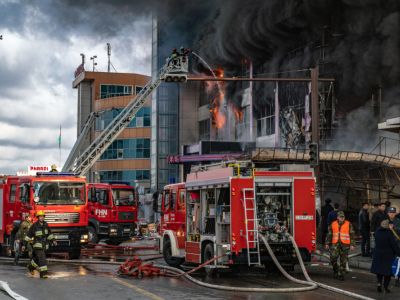Any US retaliation against the terrorists who carried out last week's devastating attacks should be based on "concrete evidence" and not hurt innocent people, China stressed Tuesday.
If these principles were followed, China would cooperate in the fight against terrorism and would not seek to link its commitment to other issues such as Taiwan, foreign ministry spokesman Zhu Bangzao said.
"The attack on terrorists should be based on concrete evidence and the act should have a clear orientation that should not hurt innocent people," he said.
China was willing "to discuss any proposal at the UN Security Council against terrorism", including expected US plans to retaliate against terrorist bases of Osama bin Laden in Afghanistan, he said.
"We made it clear that we oppose and condemn all sorts of terrorism," he told reporters at the ministry's regular briefing. "We believe that all terrorists should be punished."
In what could be a Chinese bid to keep at the forefront of international anti-terror efforts, President Jiang Zemin Tuesday had a telephone conversation with British Prime Minister Tony Blair.
"[Any retaliatory strike] must conform with the principles of the United Nations Charter and international norms, and the UN Security Council must be involved," Jiang told Blair according to state TV.
Jiang reportedly had two telephone conversations with US President George W. Bush last week in the wake of the attacks on the World Trade Center in New York and the Pentagon near Washington D.C.
At the foreign ministry briefing, Zhu said China would not demand reduced US arms sales to Taiwan in return for a pledge to help the United States in its war against terrorism.
"We urge the United States to act prudently on the Taiwan issue and observe its commitments, that's our consistent policy," Zhu said.
"The issue of the fight against terrorism is another question. It doesn't mean that we are making any bargain here," he said.
However, Zhu still urged US support for China's own efforts against "terrorism and separatists", without specifying exactly whom he considered these to be.
"The United States has asked China to provide assistance and help in the fight against terrorism," he said.
"China, by the same token, has reason to ask the United States to give its support and understanding in the fight against terrorism and separatists," he said.
China regularly condemns as "separatists" independence movements in its majority Muslim westernmost regions and in Tibet, as well as pro-independence politicians in Taiwan.
Zhu also reiterated that Beijing had no formal links with Afghanistan's ruling Taliban government.
But he revealed the Taliban had made a pledge not to aid separatist forces in China's westernmost Muslim-dominated Xinjiang Uighur region.
"At the request of the Taliban at the working level, we had some contacts with the Taliban and we expressed our principled position to the Taliban," Zhu said.
"The Taliban told us that they would not allow separatists to use Xinjiang as a base against China," he said.
No Afghan refugees were presently coming over its 70-kilometer common border along China's westernmost frontier, Zhu said.
But he refused to comment on reports the border to Afghanistan as well as that to neighboring Pakistan were closed.
"As a neighbor of Afghanistan we closely follow the development of the Afghanistan issue," he said, adding China had tried to persuade all warring parties in Afghanistan to work for a peaceful solution -- BEIJING (AFP)
© 2001 Al Bawaba (www.albawaba.com)









